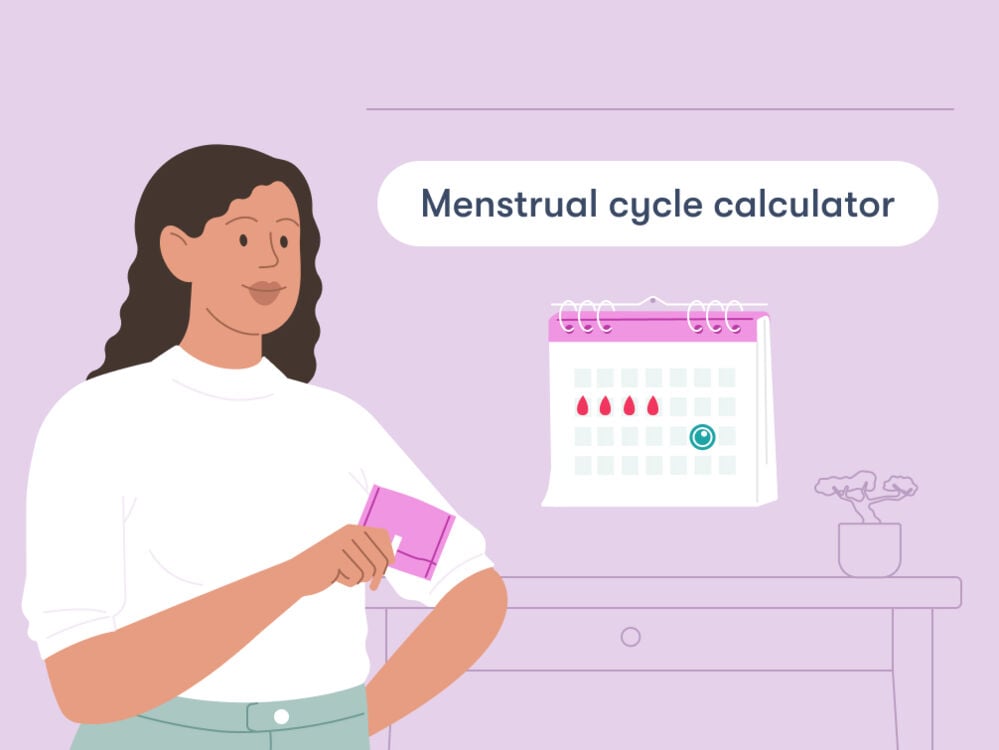-
Tracking cycle
-
Getting pregnant
-
Pregnancy
-
Help Center
-
Flo for Partners
-
Anonymous Mode
-
Flo app reviews
-
Flo Premium New
-
Secret Chats New
-
Symptom Checker New
-
Your cycle
-
Health 360°
-
Getting pregnant
-
Pregnancy
-
Being a mom
-
LGBTQ+
-
Quizzes
-
Ovulation calculator
-
hCG calculator
-
Pregnancy test calculator
-
Menstrual cycle calculator
-
Period calculator
-
Implantation calculator
-
Pregnancy weeks to months calculator
-
Pregnancy due date calculator
-
IVF and FET due date calculator
-
Due date calculator by ultrasound
-
Medical Affairs
-
Science & Research
-
Pass It On Project New
-
Privacy Portal
-
Press Center
-
Flo Accuracy
-
Careers
-
Contact Us
Menstrual cycle calculator
Being able to predict when your next period will arrive can save you a lot of hassle and help you to understand your own menstrual cycle. Predict your next period now with Flo’s easy-to-use period calculator.



Your Flo membership is now active
To start your journey:- 1. Download the Flo app.
- 2. Log in to your account.
- Remember that menstrual cycle calculators or calendars can help you learn more about your cycle, but predictions are estimates. This tool is based on an average menstrual cycle of 28 days with a luteal phase of 14 days. However, menstrual cycles will be different from person to person and can vary from month to month. There are many factors that can affect how regular a cycle is, from stress to polycystic ovary syndrome (PCOS). For more accurate cycle predictions, use the Flo app. The results are for informational purposes only and cannot, and should not, be used as a conception aid or to prevent pregnancy.
- Please note that Flo Health does not collect, process, or store any of the data that you enter while using these tools. All calculations are done exclusively in your browser. Flo Health does not have access to the results. All data will be permanently erased after leaving or closing the page.

It can be hard to keep track of where you are in your menstrual cycle, especially when your period is due. That’s where Flo’s menstrual cycle calculator can help. All you need to add above is some basic information about your last period (plus the average length of your menstrual cycle), and it’ll predict when your next period is likely to start.
To get even more accurate period predictions every month — and have them on hand whenever you want — download the Flo app. Its clever technology will help predict where you are in your cycle (and what you might expect now and in the future) so you can understand your body even better. Premium members also get a handy report at the end of every cycle so you can spot patterns and figure out what’s normal for you.
Key takeaways
- A menstrual cycle typically lasts 28 days, but anything ranging from 21 to 35 days is considered normal. Day one of your period is the first day of your menstrual cycle.
- The two main phases of the menstrual cycle are the follicular and luteal phases.
- Flo’s menstrual cycle calculator can roughly estimate period dates, while the app can give you more accurate predictions on your period, plus your fertile window, symptoms, and more, helping you better understand your body. Download the app now.
- Changes in your menstrual cycle can provide useful signals for your overall health, from pregnancy to perimenopause and underlying medical conditions.
What is the menstrual cycle?
The menstrual cycle is the sequence of events that happen in your body each month as it prepares for a possible pregnancy. It lasts from the first day of your menstrual period until the first day of your next period. An average menstrual cycle lasts 28 days, but everyone’s cycle is slightly different, and you might even notice small changes from month to month. A cycle lasting anywhere from 21 to 35 days is considered normal.
Your menstrual cycle is essential for getting pregnant, but it can affect other aspects of health too, including your mood and energy levels. A menstrual cycle calculator can take away some of the guesswork about what to expect at different phases of your cycle.
The different phases of the menstrual cycle
There are two main phases of the menstrual cycle to know: the follicular phase and the luteal phase. Plus, there are two main events that happen every cycle: your period and ovulation.
Follicular phase
Your follicular phase begins with the first day of bleeding (your period, or menstruation), which is your body shedding the lining of your uterus. Around this time, levels of the hormone estrogen start to rise, causing the lining of your uterus to thicken again in preparation for a potential pregnancy. Follicle-stimulating hormone (FSH) is also released, causing follicles (small sacs of fluid) in your ovaries to grow. Eventually, by around mid-cycle (in an average 28-day cycle), one of these developing follicles will form into a fully mature egg, which is released at ovulation.
Luteal phase
In a typical 28-day cycle, the luteal phase starts in the middle, around ovulation — the most fertile part of your cycle. A surge in luteinizing hormone (LH) triggers the release of the egg from your ovary. Our ovulation calculator can predict when your ovulation date may be, which can be handy if you’re trying to conceive. After ovulation, your egg leaves your ovary and travels through your fallopian tubes, where it may get fertilized, to your uterus. The hormone progesterone then rises to help prepare your uterine lining for a possible pregnancy. If pregnancy doesn't happen, estrogen and progesterone levels drop, and your uterine lining gets ready to shed again via your period — and your cycle starts all over again.
How can I predict my next period date?
To predict your next period, use your previous period dates and how long your cycle typically is. Note down the first day of your last period and mark it on a calendar with an X. Put an X on each of the following days that you have bleeding. Count the first X as day one.
Then, on the first day of your next period, count the number of days from the start of your previous period to the start of your next. This will tell you your cycle length.
If your periods are regular, you can usually predict your next period by adding your cycle length to the start date of your last period. Or you can predict your next period quickly now with Flo’s easy-to-use menstrual cycle calculator above.
Tracking symptoms you usually get in the run-up to your period can also give you clues as to when your period will turn up. Collectively, these are known as premenstrual symptoms. But when you experience them month after month, it could be considered premenstrual syndrome (PMS). Everyone is different, but symptoms of PMS can include breast tenderness, bloating, and mood changes in the days leading up to your period.
A period-tracking app like Flo can make predicting your next period even easier. It uses information you log from your past cycles and symptoms to give you more precise predictions over time as it learns more about your body.
The importance of understanding your menstrual cycle
Getting to know your menstrual cycle can help you connect with your body and get familiar with the changes it goes through each month. It can help you better anticipate shifts in mood, energy, and physical symptoms so you’re always prepared. Understanding your menstrual cycle can help you understand what’s typical for you and when it might be worth checking in with a doctor.
Cycle changes can also give you valuable information about your health. For instance, symptoms like skipped periods could signal pregnancy, or irregular periods may suggest you’re in perimenopause. Always speak to your doctor if your cycle suddenly changes or you have any questions or concerns.
Frequently asked questions about the menstrual cycle calculator
How do I calculate my menstrual cycle?
To calculate your menstrual cycle, count the days from the first day of one period to the first day of the next. This is your cycle length. The average cycle is 28 days, but it can range from 21 to 35 days.
Can I get pregnant right after my period?
Although on average most people ovulate mid-cycle, meaning their fertile window (the six days each cycle when they could get pregnant) falls around then, too, it is possible to get pregnant right after your period if you have a shorter cycle. Sperm can live for up to five days inside you, so if your cycles are shorter, ovulation would happen soon after your period. That means you would have a chance of getting pregnant around that time. So if a baby isn’t on your to-do list right now, always use a reliable form of contraception.
References
“Abnormal Uterine Bleeding.” The American College of Obstetricians and Gynecologists, Dec. 2021, www.acog.org/womens-health/faqs/abnormal-uterine-bleeding.
“Follicular Phase.” Cleveland Clinic, my.clevelandclinic.org/health/body/23953-follicular-phase. Accessed 5 Dec. 2024.
“Follicle-Stimulating Hormone (FSH).” Cleveland Clinic, my.clevelandclinic.org/health/articles/24638-follicle-stimulating-hormone-fsh. Accessed 5 Dec. 2024.
“Luteal Phase.” Cleveland Clinic, my.clevelandclinic.org/health/articles/24417-luteal-phase. Accessed 5 Dec. 2024.
“Luteinizing Hormone.” Cleveland Clinic, my.clevelandclinic.org/health/body/22255-luteinizing-hormone. Accessed 5 Dec. 2024.
“Menstrual Cycle.” Cleveland Clinic, my.clevelandclinic.org/health/articles/10132-menstrual-cycle. Accessed 5 Dec. 2024.
“Menstrual Cycle: What’s Normal, What’s Not.” Mayo Clinic, 22 Apr. 2023, www.mayoclinic.org/healthy-lifestyle/womens-health/in-depth/menstrual-cycle/art-20047186.
“Periods and Fertility in the Menstrual Cycle.” NHS, www.nhs.uk/conditions/periods/fertility-in-the-menstrual-cycle/. Accessed 5 Dec. 2024.
“Premenstrual Syndrome (PMS).” Mayo Clinic, 25 Feb. 2022, www.mayoclinic.org/diseases-conditions/premenstrual-syndrome/symptoms-causes/syc-20376780.
“Progesterone.” Cleveland Clinic, my.clevelandclinic.org/health/body/24562-progesterone. Accessed 5 Dec. 2024.
Witt, Barry. “Trying to Get Pregnant? Here’s When to Have Sex.” The American College of Obstetricians and Gynecologists, Aug. 2023 www.acog.org/womens-health/experts-and-stories/the-latest/trying-to-get-pregnant-heres-when-to-have-sex.
“Your First Period.” The American College of Obstetricians and Gynecologists, June 2022, www.acog.org/womens-health/faqs/your-first-period.